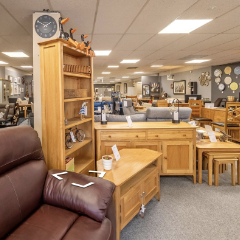-
Upholstery
+
-
Fabric Upholstery
+
- Fabric 4 Seater Sofas
- Fabric 3 Seater Sofas
- Fabric 3 Seater Manual Recliner Sofas
- Fabric 3 Seater Power Recliner Sofas
- Fabric 2 Seater Sofas
- Fabric 2 Seater Manual Recliner Sofas
- Fabric 2 Seater Power Recliner Sofas
- Fabric Sofa Beds
- Fabric Corner Sofas
- Fabric Chairs
- Fabric High Seat Chairs
- Fabric Riser Recliners
- Fabric Swivel Chairs
- Chaise Lounges
- Fabric Footstools
-
Leather Upholstery
+
- Leather 4 Seater Sofas
- Leather 3 Seater Sofas
- Leather 3 Seater Manual Recliners
- Leather 3 Seater Power Recliners
- Leather 2 Seater Sofas
- Leather 2 Seater Manual Recliners
- Leather 2 Seater Power Recliners
- Leather Corner Sofas
- Leather Chairs
- Leather Riser Recliners
- Leather Swivel Chairs
- Leather Footstools
- Upholstery By Range
-
Fabric Upholstery
+
- Dining & Living +
- Beds +
- Bedrooms +
- Clearance
- Info Pages. +
How to Stop Condensation in Your Bedroom (8 Tips)
It's the time of year when the weather gets colder, and our bedrooms become colder too.
Unfortunately, one downside of this is that we can often start to see condensation form.
This can then lead to mould growth, which is damaging to our furniture, home and health.
So today, we're going to share some tips on how to stop condensation in your bedroom.
Keep reading for more information!
.png)
Install a dehumidifier
High humidity levels can create several problems in the home, from condensation on windows to musty smells.
In the bedroom, high humidity can also lead to discomfort during sleep. One way to reduce the amount of moisture in the air is to install a dehumidifier.
Electric dehumidifiers work by drawing in air from the room and passing it over a cold coil.
This condenses the water vapour in the air, and the water is collected in a tank or drained away through a hose.
Some electric dehumidifiers can be expensive, however, there are affordable dehumidifier boxes that you could instead.
These work by absorbing moisture from the air and can be placed on a windowsill or desk.
By reducing the amount of moisture in the air, dehumidifiers can help to make your bedroom more comfortable and habitable.
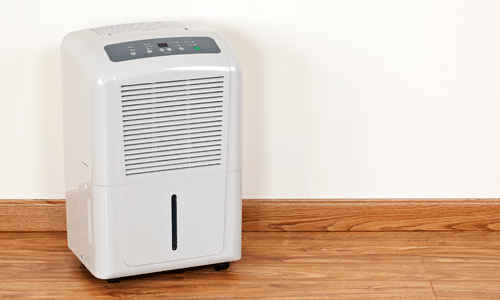
Use a fan to circulate the air
Another effective method for reducing condensation is to use a fan.
By circulating the air, it will help the air to dry faster. This is especially useful after cooking or taking a shower, as the fan will help to remove the humid air from the room.
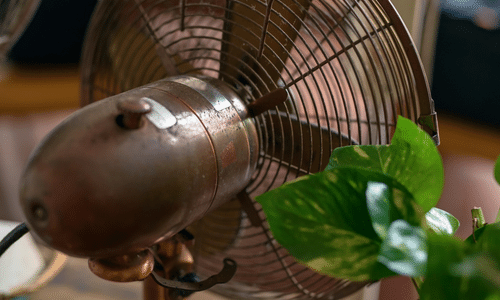
Open your windows
In addition to using a fan or dehumidifier, it is also important to open your windows on a daily basis.
This will help to ventilate the room and allow fresh, dry air to circulate.
If you are unable to open your windows due to security concerns, consider installing an air vent.
Air vents work by allowing air to flow into the room, without opening the window.
This is a great alternative for those who want to improve the ventilation in their home, without compromising security.
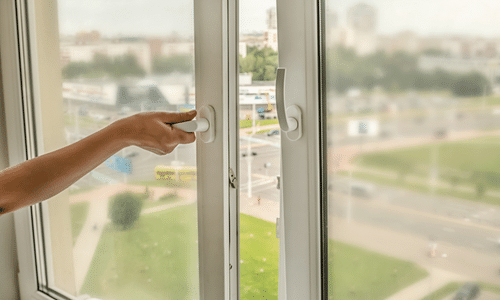
Keep your bedroom's temperature consistent
Another way to reduce condensation is to keep the temperature in your bedroom consistent.
If the temperature fluctuates, when your room reheats, the hot air meeting the cold surfaces will cause condensation.
By keeping the temperature consistent, you can help to prevent this from happening.
While you could leave your heating set at the desired temperature, this could become expensive if your home is poorly insulated.
Therefore, it's advised to insulate your home if you can as this will help to manage condensation and reduce your energy bills.
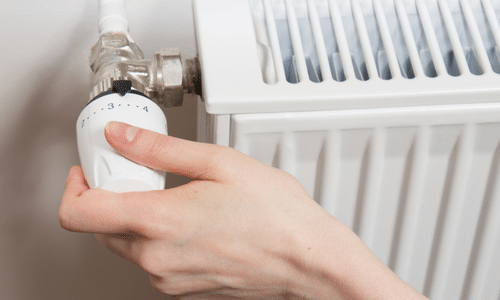
Avoid drying clothes and towels in your bedroom
Wet clothes and towels may be the cause of moisture build-up in your bedroom.
Instead of drying your clothes in your bedroom, place them on radiators in different rooms or hang them outside to dry.
Hanging your laundry outside can save you money on your energy bills. Alternatively, you could use a tumble dryer.
While these can be pretty expensive to run they offer a way to dry your clothes in wetter and colder months.
Just be sure to make sure the dryer is properly vented as not doing so could cause moisture to build up in your home.
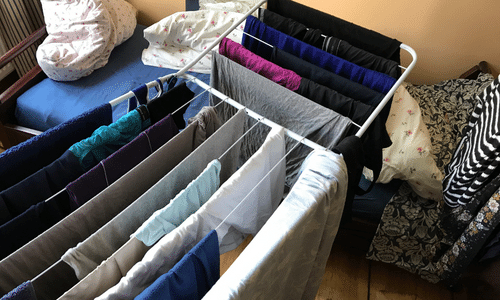
Check window seals for any damage
One way to prevent condensation inside your bedroom is to check the seals around your windows.
If the seals are damaged, it can cause moisture to build up between the panes of glass, which will eventually lead to condensation.
The best way to check the seals is to look for any gaps or cracks.
If you find any, you should try to get the seals replaced when possible. By taking these simple steps, you can help to prevent condensation inside your home.
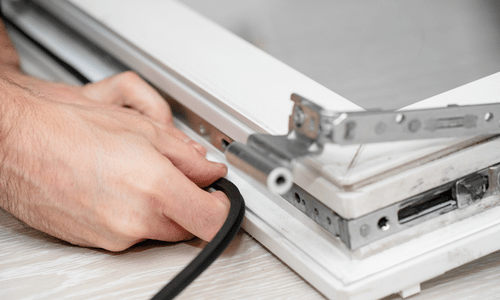
Open curtains and blinds
One of the best ways to prevent condensation is to keep the air circulating. When curtains and blinds are open, trapped moisture has a chance to escape.
By opening the windows and doors, you can help to keep the air moving and prevent condensation from forming.
In addition, using a dehumidifier can also help to reduce the amount of moisture in the air.
By taking these simple steps, you can help to prevent condensation from damaging your home.

Reduce steam in your home
When cooking or showering, steam can quickly build up in your home and lead to condensation on walls and windows.
This can be particularly problematic for your bedroom if you have an ensuite connected.
To reduce steam in your home is to use extractor fans when cooking or showering.

This will help to remove the moist air from your home and prevent it from condensing on surfaces.
Additionally, make sure to close doors between rooms to prevent the steam from spreading throughout your home and reaching your bedroom.
By taking these simple steps, you can help to reduce condensation and keep your home comfortable and dry.
Condensation can be a big problem for homeowners, as it can damage their homes and lead to the growth of mould.
There are many things that you can do to prevent condensation from forming in your home.
By opening windows, blinds and curtains, keeping the temperature consistent, drying clothes outside of your bedroom, allowing air to circulate and checking window seals for any damage, you can help to keep the air moving and stop moisture from building up.
Additionally, you can use extractor fans and dehumidifiers to remove the moist air from your home.
By taking these simple steps, you can help to keep your home healthy and dry.













